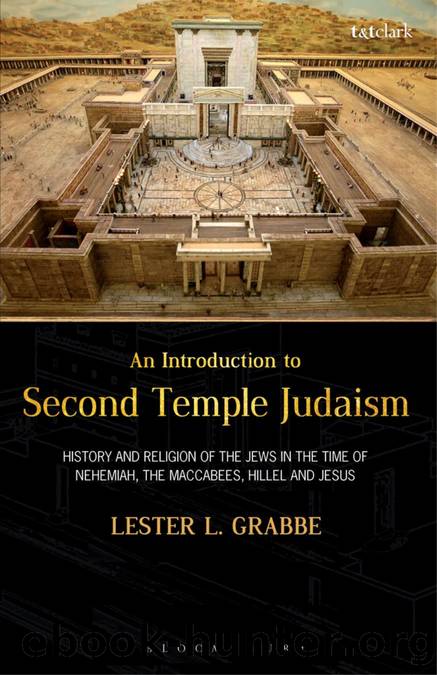An Introduction to Second Temple Judaism by Grabbe Lester L.;

Author:Grabbe, Lester L.;
Language: eng
Format: epub
ISBN: 9780567296665
Publisher: Bloomsbury UK
Published: 2019-12-18T00:00:00+00:00
3.5 The ‘Fourth Philosophy’ and the Sicarii
When Judaea became a Roman province in 6 ce, a census was taken (mistakenly dated in Luke 2:1–3 to the time of Herod’s reign). Many Jews protested against this, but the bulk of the people gradually acquiesced after intervention by the high priest. Josephus writes (Antiquities 18.1.1 §§4–10):
But a certain Judas, a Gaulanite from a city named Gamala, who had enlisted the aid of Saddok, a Pharisee, threw himself into the cause of rebellion. They said that the assessment carried with it a status amounting to downright slavery, no less, and appealed to the nation to make a bid for independence. They urged that in case of success the Jews would have laid the foundation of prosperity, while if they failed to obtain any such boon, they would win honour and renown for their lofty aim; and that Heaven would be their zealous helper to no lesser end than the furthering of their enterprise until it succeeded – all the more if with high devotion in their hearts they stood firm and did not shrink from the bloodshed that might be necessary. Since the populace, when they heard their appeals, responded gladly, the plot to strike boldly made serious progress; and so these men sowed the seed of every kind of misery, which so afflicted the nation that words are inadequate . . . In this case certainly, Judas and Saddok started among us an intrusive fourth school of philosophy; and when they had won an abundance of devotees, they filled the body politic immediately with tumult, also planting the seeds of those troubles which subsequently overtook it, all because of the novelty of this hitherto unknown philosophy that I shall now describe.
He also suggests that the ‘Fourth Philosophy’ gave rise to the Sicarii in the 40s. The Sicarii took their name from a type of dagger, called the sica in Latin. One might with good reason translate their name as ‘Assassins’. They would conceal the dagger inside their clothing, get close to an official in the throng, strike quickly, and slip back into the crowd before being apprehended. This is what Josephus says about their connections with the Fourth Philosophy (Antiquities 18.1.6 §§23–25):
As for the fourth of the philosophies, Judas the Galilaean set himself up as leader of it. This school agrees in all other respects with the opinions of the Pharisees, except that they have a passion for liberty that is almost unconquerable, since they are convinced that God alone is their leader and master . . . The folly that ensued began to afflict the nation after Gessius Florus, who was governor, had by his overbearing and lawless actions provoked a desperate rebellion against the Romans.
Whether or not he should be believed about the origins of the Sicarii is a matter of debate since Josephus was unsympathetic to the various revolutionary groups and might want to see them as all connected. If he is right, however, there was a line stretching
Download
This site does not store any files on its server. We only index and link to content provided by other sites. Please contact the content providers to delete copyright contents if any and email us, we'll remove relevant links or contents immediately.
| Haggadah | Hasidism |
| History | Holidays |
| Jewish Life | Kabbalah & Mysticism |
| Law | Movements |
| Prayerbooks | Sacred Writings |
| Sermons | Theology |
| Women & Judaism |
The Secret Power of Speaking God's Word by Joyce Meyer(2762)
Man's Search for Meaning by Viktor E. Frankl(2559)
Mckeown, Greg - Essentialism: The Disciplined Pursuit of Less by Mckeown Greg(2336)
MOSES THE EGYPTIAN by Jan Assmann(2283)
Devil, The by Almond Philip C(2208)
Unbound by Arlene Stein(2186)
The Complete Dead Sea Scrolls in English (7th Edition) (Penguin Classics) by Geza Vermes(2147)
I Capture the Castle by Dodie Smith(1914)
Schindler's Ark by Thomas Keneally(1764)
The Invisible Wall by Harry Bernstein(1709)
The Gnostic Gospel of St. Thomas by Tau Malachi(1687)
The Bible Doesn't Say That by Dr. Joel M. Hoffman(1611)
The Secret Doctrine of the Kabbalah by Leonora Leet(1537)
Political Theology by Carl Schmitt(1505)
The Jewish State by Theodor Herzl(1472)
A History of the Jews by Max I. Dimont(1445)
The Dead Sea Scrolls Bible by Martin G. Abegg(1429)
The Book of Separation by Tova Mirvis(1423)
Oy!: The Ultimate Book of Jewish Jokes by David Minkoff(1297)
